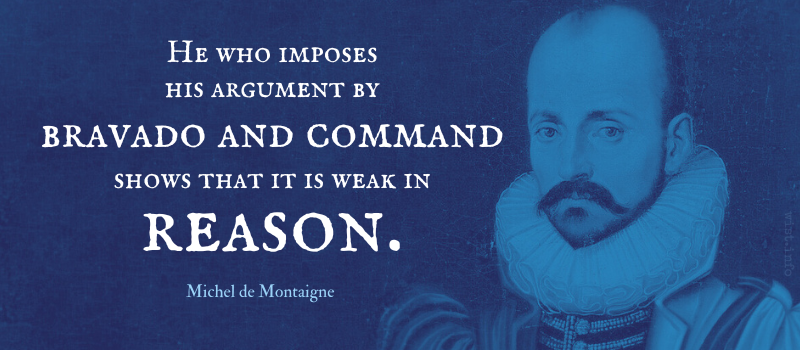Laughter is poison to fear.
George R. R. Martin (b. 1948) American author and screenwriter [George Raymond Richard Martin]
A Game of Thrones, “Catelyn” 8 [Catelyn Stark] (1996)
(Source)
Quotations about:
intimidation
Note not all quotations have been tagged, so Search may find additional quotes on this topic.
Men who want to be feared must necessarily fear the very people who fear them.
[Etenim qui se metui volent, a quibus metuentur, eosdem metuant ipsi necesse est.]
Marcus Tullius Cicero (106-43 BC) Roman orator, statesman, philosopher
De Officiis [On Duties; On Moral Duty; The Offices], Book 2, ch. 7 (2.7) / sec. 24 (44 BC) [tr. Edinger (1974)]
(Source)
(Source (Latin)). Alternate translations:For those who desire to have others be afraid of them, must needs be afraid of those others in their turns.
[tr. Cockman (1699)]For they who desire to become objects of terror to others, must dread those who regard them with fear.
[tr. McCartney (1798)]For it is a necessary consequence, that men fear those very persons by whom they wish to be feared.
[tr. Edmonds (1865)]For it is inevitable that those who wish to be feared should themselves fear the very persons by whom they are feared.
[tr. Peabody (1883)]For men involuntarily fear those whom they intimidate.
[tr. Gardiner (1899)]Those who wish to be feared must inevitably be afraid of those whom they intimidate.
[tr. Miller (1913)]
They had all been brought up, as we still are, to believe in “the deterrent.” Firm resolve, a readiness to threaten war, would avert war itself. Some Power would always give way. This usually happened, indeed happened so often that the wisdom of the method seemed sure. In 1914 all the Powers, for different reasons, expected the yielding to come from the other side.
A. J. P. Taylor (1906-1990) British historian, journalist, broadcaster [Alan John Percivale Taylor]
“What Else Indeed?” New York Review of Books (5 Aug 1965)
(Source)
Some people are to be reasoned, some flattered, some intimidated, and some teased into a thing; but, in general, all are to be brought into it at last, if skillfully applied to, properly managed, and indefatigably attacked in their several weak places.
Lord Chesterfield (1694-1773) English statesman, wit [Philip Dormer Stanhope]
Letter to his son, #183 (22 May 1749)
(Source)
The probability that we may fall in the struggle ought not deter us from the support of a cause we believe to be just; it shall not deter me.
The question [is] asked, “Is it common for a nation to obtain a redress of wrongs by war?” The answer to this question you will of course draw from history. In the meantime, reason will answer it on grounds of probability, that where the wrong has been done by a weaker nation, the stronger one has generally been able to enforce redress; but where by a stronger nation, redress by war has been neither obtained nor expected by the weaker. On the contrary, the loss has been increased by the expenses of the war in blood and treasure. Yet it may have obtained another object equally securing itself from future wrong. It may have retaliated on the aggressor losses of blood and treasure far beyond the value to him of the wrong he had committed, and thus have made the advantage of that too dear a purchase to leave him in a disposition to renew the wrong in future. In this way the loss by the war may have secured the weaker nation from loss by future wrong.
Thomas Jefferson (1743-1826) American political philosopher, polymath, statesman, US President (1801-09)
Letter to Noah Worcester (29 Jan 1816)
(Source)
Fear: A club used by priests, presidents, kings and policemen to keep the people from recovering stolen goods.
Elbert Hubbard (1856-1915) American writer, businessman, philosopher
The Roycroft Dictionary (1914)
(Source)
It is not to be supposed that the age-old readiness to try to convert minds by pressure or suppression, instead of reason and persuasion, is extinct. Our protection against all kinds of fanatics and extremists, none of whom can be trusted with unlimited power over others, lies not in their forbearance, but in the limitations of our Constitution.
Robert H. Jackson (1892-1954) US Supreme Court Justice (1941-54), lawyer, jurist, politician
American Communications Association v. Douds, 339 U.S. 382, 438-439 (1950) [concurrence and dissent]
(Source)
“What a brain, Mister Vandemar. Keen and incisive isn’t the half of it. Some of us are so sharp,” he said as he leaned in closer to Richard, went up on tiptoes into Richard’s face, “we could just cut ourselves.”
Neil Gaiman (b. 1960) British author, screenwriter, fabulist
Neverwhere, ch. 2 [Mr. Croup] (1996)
(Source)
So let us begin anew — remembering on both sides that civility is not a sign of weakness, and sincerity is always subject to proof. Let us never negotiate out of fear. But let us never fear to negotiate.
You can discover what your enemy fears most by observing the means he uses to frighten you.
Eric Hoffer (1902-1983) American writer, philosopher, longshoreman
The Passionate State of Mind, Aphorism 222 (1955)
(Source)
He who imposes his argument by bravado and command shows that it is weak in reason.
[Qui establit son discours par braverie et commandement, montre que la raison y est foible.]Michel de Montaigne (1533-1592) French essayist
Essays, Book 3, ch. 11 “Of Cripples [Des Boyteux]” (1587) (3.11) (1595) [tr. Frame (1943)]
(Source)
(Source (French)). Alternate translations:He that with braverie and by comaundement will establish his discourse, declareth his reason to be weake.
[tr. Florio (1603), "Of the Lame or Cripple"]Who will establish his Discourse by Authority and Huffing, discovers his Reason to be very weak.
[tr. Cotton (1686)]He who will establish this proposition by authority and huffing discovers his reason to be very weak.
[tr. Cotton/Hazlitt (1877), "On the Lame"]He who establishes his argument by defiance and by command shews that his reasoning is weak.
[tr. Ives (1925)]Any man who supports his opinion with challenges and commands demonstrates that his reasons for it are weak.
[tr. Screech (1987), "On the Lame"]He who establishes his argument by noise and command shows that his reason is weak.
[Source]














